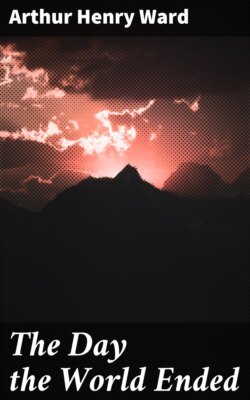Читать книгу The Day the World Ended - Arthur Henry Ward - Страница 17
На сайте Литреса книга снята с продажи.
1
ОглавлениеTable of Contents
Taking all things into consideration, I doubted if it were possible for me to cover my tracks. A conviction was growing that I had to do with enemies whose methods of observation left me no means of countering.
The facts underlying all this mystery I had yet to learn. Upon what astounding intrigue had I innocently blundered? But I was now certain that these facts were of a character which would not bear light of day. The winged horror of the cemetery definitely defied conjecture. It was supernormal. The Voice formed a complement to it. But my midnight visitor, who imitated night watchmen, was a tangible opponent with whom one might hope to come to grips. Mme. Yburg.... ?
If there were vampires in the Black Forest, then certainly they had human accomplices—and clever ones. But with these, at least, I could deal.
I made several calls in the town, some of them necessary and others mere red herrings. On coming out from each of the offices and shops, I assured myself that none of the suspects, A, B, or C, was in sight. Presently, leaving the Bank, I turned sharply right and set out upon the real business of the day.
My plans from this moment onward included avoidance of spots in which I was likely to meet acquaintances. A study of the map had enabled me to lay a safe course. Once clear of the outskirts of the town, I counted myself moderately safe from ordinary espionage.
This route lay up climbing streets, in which the houses stood upon most various elevations. Whereas one would be based upon the level, the next might equally well be upraised upon so high a rocky foundation that its porch overlooked the roof of a neighbour.
Flowers there were everywhere: set in window boxes, lining porches, bordering long flights of steps leading up to the more elevated sites, crowding the forecourts of those houses which opened directly on to the pavement.
The byways of the town are very quiet. And as I mounted ever nearer to the forest, it became less and less possible that I should be tracked without my knowledge. I took frequent occasion to pause and glance around me, also back and downward upon the route below.
Not once did I detect a follower—a fact which, in view of what happened later, is noteworthy, being a sidelight upon the methods of a very extraordinary man.
Once really clear of the town, I took fewer precautions. For a mile and a half my way was along woodland roads where travellers were rare.
At a point selected earlier that morning, a car awaited me. I had chosen the man with care. As a result of conversation with the Dutch bookseller and a close study of my map, I had come to the conclusion that there was only one coign of vantage from which I might hope to command a view of Felsenweir. (In this, by the way, I was wrong.) Part of the route was possible by car; the last half mile merely a forest path.
My purpose was secretly to study the ruins, closely and for a considerable time, with a view to learning if they were inhabited. And, at the moment of joining the car at the place appointed, a conviction seized me that my well-laid schemes had gone “a-gley.”
Something in the chauffeur’s behaviour seemed odd. He sprang down with alacrity and opened the door; but his glance was furtive—unfriendly.
Around me was the beautiful silence of woodlands. I might look through straight upstanding pines, and as far as sight could reach nothing stirred. Left of the climbing road a rock wall rose sheer for twenty feet or more. Above it, and beyond, on a slight gradient, the forest mounted to a distant peak.
And now, in this solitude where almost anything could happen and never be heard of in the world of men, I realized that I was dealing with criminals of a unique kind; such as perhaps only mediæval laws could reach—with human outcasts, pariahs so far beyond our modern pale that the life of an intruder would mean less to them than the flame of a candle.
By means which I utterly failed to understand, the Voice had learned the object of my visit to the Black Forest. To his—or to its—human accomplices had been assigned the task of learning how much I knew.
Now, noting an unmistakable change of demeanour in the man whom I had engaged early that morning outside the Kurhaus, the possibility crashed in on my mind that he might be one of them!
At which moment I observed something that seemed to confirm my unpleasant theories. On the point of entering, I turned and looked at the driver. But he evaded my glance.
“You told me, I think, that you had never been this way before?”
“Never, sir. No one ever comes.”
I had given him to understand that I was a geologist; but now:
“It must lead somewhere,” I said, “beyond the point to which we are going?”
“It leads to an old ruined monastery,” he replied—“but not interesting, and then a mile further on it joins the Alt-Eberstein road.”
He persistently avoided meeting my glance, but, nevertheless, I resigned myself to the next stage of the journey. As I dropped back on the cushions and the man returned to the wheel, I wondered why he was lying.
Because, on the finely powdered pine cone which coated the surface, clearly defined tire-tracks showed as far ahead as I could see.
And they had been made by the same brand of tire as that which shod the car I sat in!
